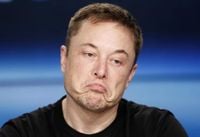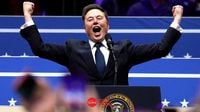Elon Musk, the world’s richest man and CEO of Tesla, has once again sent shockwaves through American politics by announcing the formation of a new political party called the "America Party." This bold move, unveiled on July 5, 2025, comes just a day after Musk conducted an online poll on his social media platform X, asking his followers if they wanted freedom from the traditional two-party system or a single authoritarian party. According to Musk, the poll results revealed a strong desire among Americans for a new political alternative to restore true freedom.
However, the announcement has sparked a flurry of reactions from all sides, raising questions about Musk’s political ambitions, his management of Tesla, and the viability of a third party in the deeply entrenched U.S. political landscape.
Azoria Partners, an investment firm that had planned to launch the Azoria Tesla Convexity ETF, announced on July 6 that it would indefinitely delay the fund’s registration. The postponement came in the wake of Musk’s political announcement, which unsettled investor confidence. James Fishback, CEO of Azoria, openly criticized Musk’s sudden political pivot, posting on X that he supported former President Donald Trump and expressing concerns about Musk’s dedication to Tesla amidst his new political endeavors. Fishback called for urgent clarification from Musk regarding his political stance and whether it aligns with his responsibilities as Tesla’s CEO.
Azoria’s hesitation reflects broader investor unease, especially after Tesla’s stock took a hit earlier this year amid Musk’s public disputes with Trump over government spending policies. In May 2025, Musk announced he would reduce his role in Tesla’s Department of Government Efficiency (DOGE), signaling a shift in focus that now seems to extend into the political arena.
The timing of Musk’s political leap is notable, coming just days after President Trump signed the "One Big Beautiful Bill" (OBBB) into law on July 4, 2025. This massive spending package included multi-trillion-dollar tax cuts, increased immigration enforcement funding, and cuts to Medicaid and renewable energy subsidies, specifically targeting programs that had benefited Musk’s companies. Musk voiced opposition to the bill, aligning himself with Republican Senator Rand Paul’s critique that it would dangerously increase the national deficit and prioritize short-term politics over long-term sustainability.
Trump, for his part, dismissed Musk’s new party as a "funny matter" and warned that a third party would only confuse voters. He emphasized the historic dominance of the two-party system in the U.S., noting that third parties have never succeeded nationally. Political analysts echoed this skepticism, pointing to past third-party candidates like Ross Perot in 1992 and Ralph Nader in 2000, who, despite making significant waves, failed to secure electoral votes and often acted as spoilers rather than contenders.
Launching a third party in the U.S. is notoriously difficult, and Musk faces at least six formidable hurdles, as outlined in a recent Washington Post analysis. First, the "winner-take-all" electoral system requires candidates to win outright in individual districts to gain representation, unlike proportional systems in other democracies that allow smaller parties to gain seats with a fraction of the vote. This makes it nearly impossible for a new party to build a foothold without winning key districts.
Second, historical precedent shows third parties rarely achieve sustained national success. While they can disrupt elections, they seldom break the duopoly of Democrats and Republicans.
Third, Musk’s strategy to "concentrate power at important strategic points" by focusing resources on a few critical midterm election districts is ambitious but unproven. Experts suggest that even if his candidates don’t win outright, they could siphon votes from Republicans in battleground states, potentially altering outcomes. However, this tactic risks alienating potential allies.
Fourth, Musk’s belief that 80% of Americans are a politically centrist "middle" dissatisfied with both major parties is contested. Georgetown University political analyst Hans Noel argues that this group lacks ideological cohesion and remains emotionally tied to their existing parties despite frustrations.
Fifth, Musk has lost key political allies, notably his previous support for Trump and the Republican Party, making it difficult to build the loyal, grassroots network essential for a new party’s survival. Although smaller groups like the Libertarian Party and the centrist "No Labels" movement have expressed interest in collaboration, their influence remains limited.
Sixth and perhaps most daunting is Musk’s own temperament. Known for his impatience and desire for rapid results in his business ventures, Musk may find the slow, complex, and often frustrating nature of politics a tough adjustment. His previous political spending includes a $20 million investment in a conservative judicial candidate in Wisconsin in early 2025, part of a $100 million campaign that ultimately lost. Following that defeat, Musk said he would "significantly reduce" political spending but left open the possibility of future involvement if "necessary reasons" arise.
Meanwhile, Tesla’s stock has experienced volatility linked to Musk’s political moves. After a steep drop in early July 2025, when the company lost $152 billion in market value and briefly fell below a $1 trillion valuation, shares have partially rebounded but remain under their pre-conflict levels. Investors are wary of Musk’s divided attention between his business and political ambitions.
Azoria Partners’ plans to launch another ETF, the Azoria 500 Meritocracy ETF, which targets 500 large U.S. companies without diversity, equity, and inclusion (DEI) hiring mandates, also reflect the growing politicization of investment strategies amid this turbulent backdrop.
At its core, Musk’s political gamble is a test of whether his immense wealth and vision can overcome the entrenched realities of American politics. The U.S. system’s structural barriers, historical precedents, and the need for deep-rooted political alliances pose steep challenges. Yet, Musk’s willingness to disrupt the status quo aligns with his broader reputation as a visionary willing to take risks.
As Musk pushes forward with the America Party, the nation watches closely. Will this be the birth of a viable third force in U.S. politics, or another fleeting chapter in the country’s two-party saga? Only time will tell if the billionaire’s gamble pays off or if the political establishment proves too formidable to topple.





